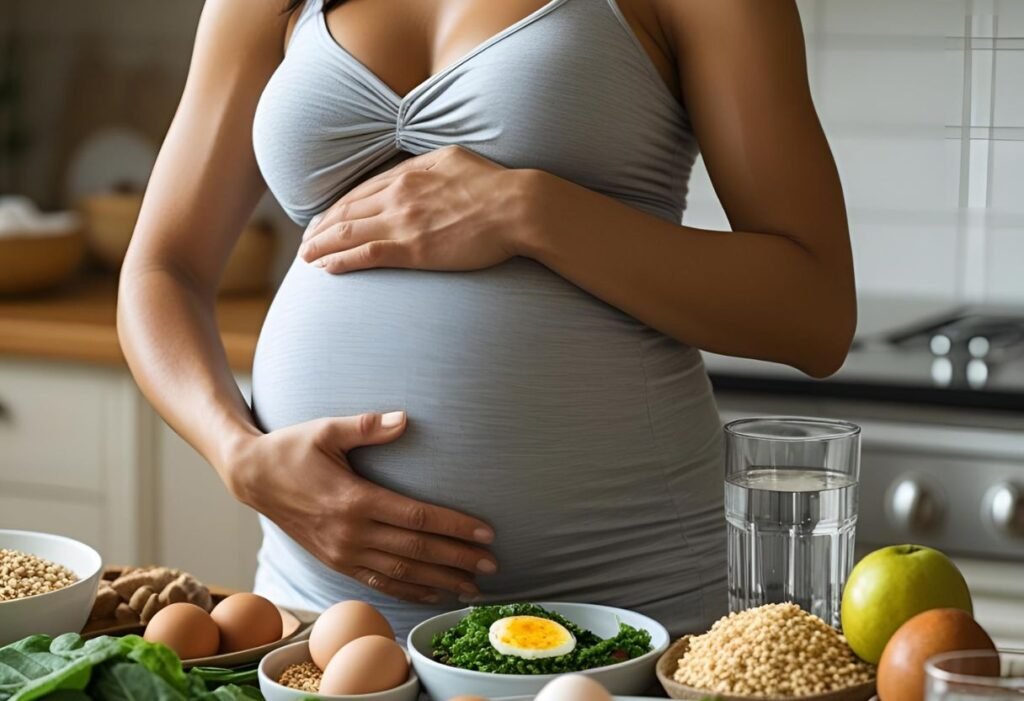Maternal Nutrition Guide for Pregnancy and Postnatal Care
Clinical resource for use in patient education
Overview
Nutrition plays a critical role in pregnancy and postpartum recovery. As healthcare professionals, we are uniquely positioned to support women in meeting their increased nutritional demands through practical, evidence-based advice, especially during periods of physiological stress, time pressure and heightened nutritional vulnerability.
Maternal nutrition is directly linked to outcomes including:
- Fetal neural tube development (folate)
- Birth weight and gestational age (iron, protein, total energy intake)
- Infant cognitive outcomes (iodine, choline, DHA)
- Postnatal healing, milk production, and mental health
Emerging research also suggests that poor dietary quality may contribute to increased risk of:
- Gestational diabetes mellitus (GDM)
- Preterm birth
- Iron-deficiency anaemia
- Postnatal depression
A nutrient-dense dietary pattern supports both maternal and infant health and reduces the need for reactive interventions.
Nutrient Priorities
| Nutrient | Clinical Role | Key Dietary Sources | RDI (Pregnancy) |
|---|---|---|---|
| Folate | DNA synthesis, neural tube closure | Leafy greens, legumes, fortified cereals | 600 mcg DFE |
| Iron | Red blood cell production, oxygen transport | Lean red meat, lentils, spinach, iron-fortified foods | 27 mg |
| Calcium | Skeletal growth, muscle/nerve signalling | Dairy, tofu, fish with bones, leafy greens | 1000 mg |
| Vitamin D | Calcium absorption, immune modulation | Sunlight, fortified foods, supplements | 600 IU (15 mcg) |
| Omega-3 DHA | Fetal brain and retina development | Oily fish, fish oil, algae-based DHA | 200–300 mg DHA |
| Iodine | Thyroid function and fetal neurodevelopment | Iodised salt, eggs, dairy, seafood | 220 mcg |
| Choline | Neural tube and brain development | Eggs, soybeans, lean meat, broccoli | 440 mg |
| Protein | Tissue repair, fetal growth, lactation support | Eggs, dairy, meat, legumes | 1.1 g/kg/day |
Postnatal Considerations
The postpartum period brings increased nutritional requirements for women who are:
- Recovering from birth (especially caesarean section or perineal trauma)
- Breastfeeding
- Experiencing fatigue, low mood, or appetite changes
Breastfeeding increases needs for:
- Energy (+2000 kJ/day approx.)
- Fluid intake (approx. 8–10 cups/day)
- Iodine (270 mcg/day)
- Vitamin A, B12, choline, and DHA
Safe Food Practices During Pregnancy
To prevent foodborne illness (e.g. listeriosis, salmonella), advise patients to avoid:
- Unpasteurised dairy, soft cheeses, deli meats unless reheated
- Raw/undercooked eggs or meat
- Pre-prepared salads near expiry
- High-mercury fish (e.g. marlin, shark, swordfish)
- Alcohol (no safe threshold)
- Excessive caffeine (limit to <200 mg/day)
Practical Advice for Patients
- Encourage simple, realistic meal planning using pantry staples (e.g. legumes, eggs, oats, tinned fish)
- Recommend use of frozen/canned vegetables to improve access and reduce prep time
- Promote snacks that combine protein, fibre and healthy fats (e.g. yoghurt with fruit, eggs, nut butter on toast)
- Normalise small, frequent meals for patients experiencing nausea or low appetite
- Reinforce that nutrition does not need to be perfect—progress over perfection
Screening and Support
Consider routine assessment of dietary intake during pregnancy/postpartum, especially for patients who:
- Have low BMI, anaemia, or high parity
- Are following restrictive diets (e.g. vegan, low carb, food insecurity)
- Report fatigue, mood concerns, or low appetite
- Are breastfeeding multiples or recovering from surgical birth
Supports
- Accredited Practising Dietitians (APDs)
- Local food relief programs (Ask Izzy app)
- Lactation consultants
- Maternal mental health supports (e.g. PANDA, local perinatal MH services)
Quote to Share with Patients
“Taking care of yourself doesn’t mean ‘me first,’ it means ‘me too.'”
— L.R. Knost, author and gentle parenting advocate
Use this quote to encourage women to prioritise their own health without guilt. Self-care supports better outcomes for both mother and child.

Further Learning for practitioners
At Meducate, we’re committed to supporting practitioners with practical, evidence-based tools that grow with your practice. We’re here to support you now and as your professional development continues.
Free CPD-accredited courses
Medheads Podcast
Meducate YouTube Library
Educational Resource: Breast Milk Science
Unlocking the Secrets of Breast Milk: Benefits Beyond Nutrition with Elena Medo.
This short video explains the bioactive properties of breast milk—including its immunological and cellular functions—ideal for antenatal education or postpartum reinforcement.

